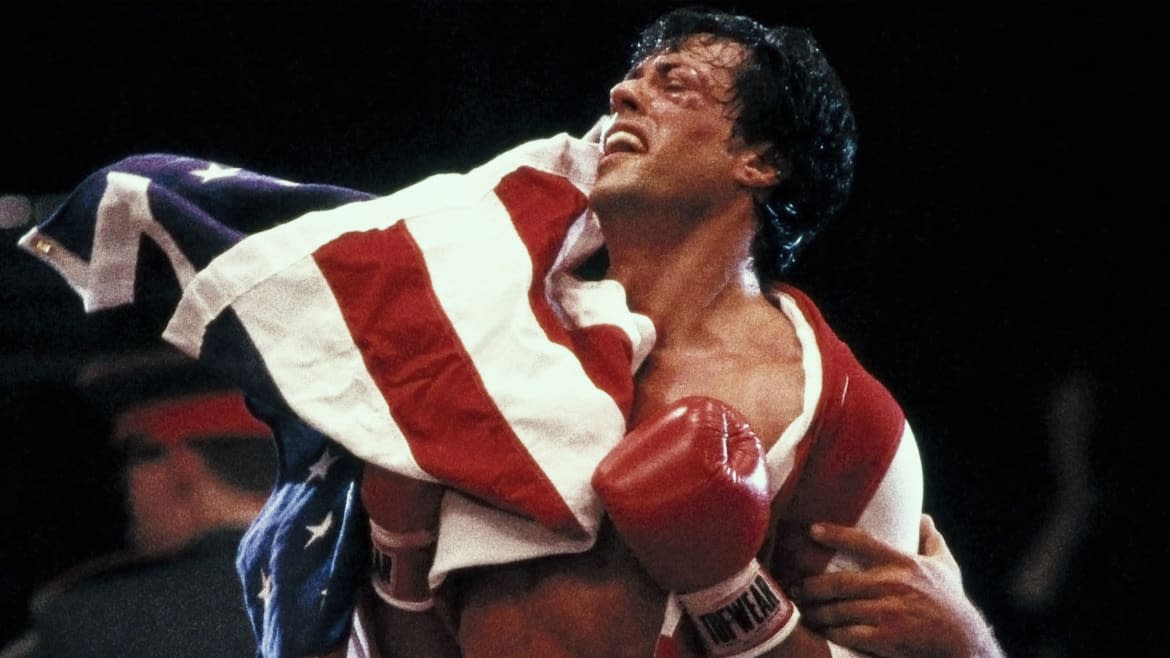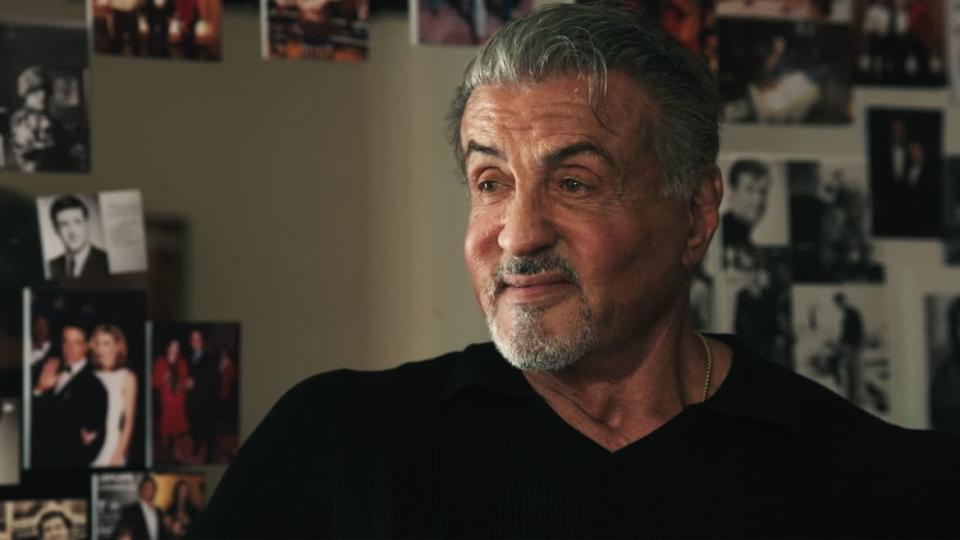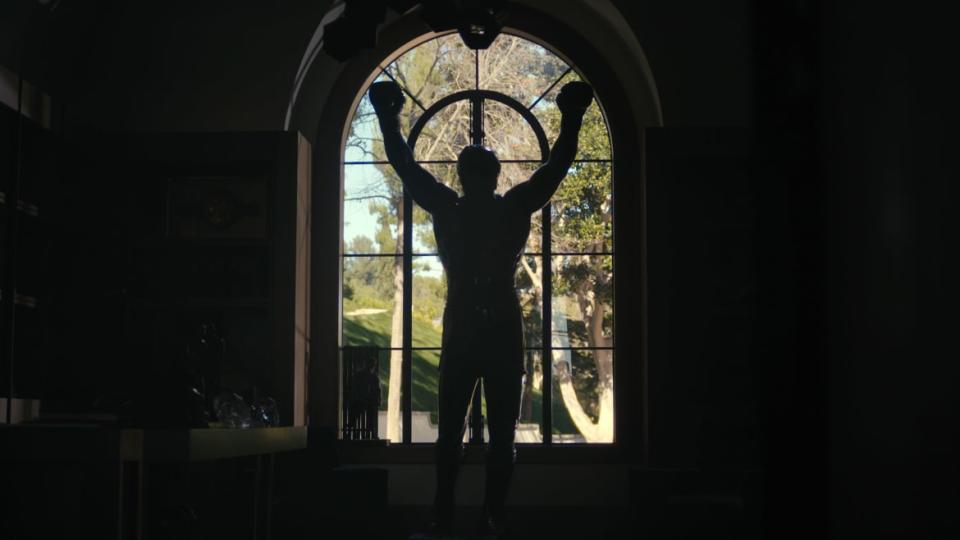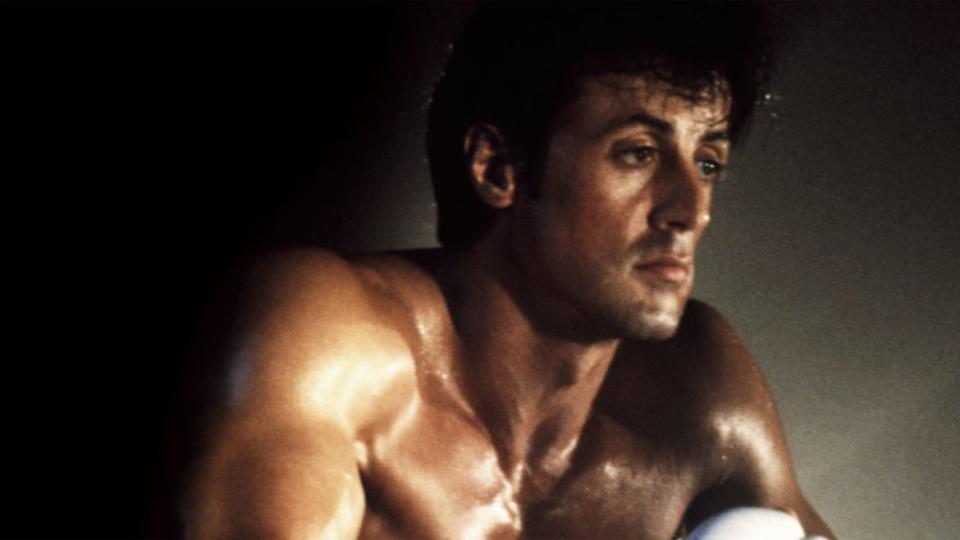Sylvester Stallone’s Netflix Doc Is a Superficial Dud

- Oops!Something went wrong.Please try again later.
- Oops!Something went wrong.Please try again later.
Sylvester Stallone paints himself as a self-made man who created a Hollywood persona rooted in his true character, struggles and spirit in Sly, Thom Zimny’s hagiographic documentary. By letting him tell his own tale, however, this non-fiction affair—debuting on Netflix Nov. 3, following its world premiere at this fall’s Toronto International Film festival—provides only some of his story, its up-close-and-personal view masking as much as it reveals.
“Hell yeah, I have regrets. But that also is what motivates me to overcome the regrets,” says Stallone at the start of Sly. As the ensuing snapshot of the artist conveys, the mistakes that most plague him have to do with prioritizing work over family. Despite much talk about putting his career ahead of his wife and children, though, there’s so little substantial mention of his clan or personal life that the sentiment rings hollow. It’s not that Stallone seems to be lying so much as he wants to grapple with such issues via generalities. By refusing to even say his kids’ or wife’s names on-camera, much less discuss the nature of his relationships with them, he neuters his own purported desire to reckon with the missteps he believes he’s made along his A-list career path.
Superficiality is the name of Sly’s game—a not-uncommon state of affairs for an authorized bio-doc guided by the participation of its subject. Zimny’s film is framed by Stallone’s decision to move out of his Los Angeles mansion and back to New York, where he was born in Hell’s Kitchen to a domineering mom and physically brutal dad. It’s the latter who proves a recurring focal point, since once his parents split, Stallone relocated to Maryland with his father and, by his account, suffered repeated physical and emotional abuse. Stallone makes clear that his old man’s violence and lack of support drove him to court audiences’ acceptance and adoration, as well as to make that a constant theme in his work. Nowhere was that more evident than in Rocky, the Oscar-winning underdog saga that turned the struggling actor-writer into an overnight sensation and forever changed his personal and professional fortunes.
Zimny’s film spends considerable time on Rocky and, in particular, the many ways in which it reflected Stallone’s own situation at the time—a life-imitating-art dynamic that would continue throughout the majority of its sequels. In those parallels, as well as the connections between Stallone and his other famous role, Vietnam War veteran John Rambo, Sly posits Stallone as someone who used genre to express his own fears, dreams and personality. Aided by interviews with critic Wesley Morris, directors Quentin Tarantino and John Herzfeld, and colleagues and friends Henry Winkler and Talia Shire, it reinforces the image of Stallone as a creative type who projected himself through acting and writing, and how that process resulted in immense critical and box-office triumphs as well as, ultimately, quite a few missteps. Those included his initial Rocky follow-ups F.I.S.T. and Paradise Alley or his later comedic forays Oscar and Stop! Or My Mom Will Shoot, the latter of which Stallone took on, according to Arnold Schwarzenegger, because of their intense rivalry.
That anecdote is recycled from Schwarzenegger’s own Netflix puff-piece documentary Arnold, and it’s presented in the sort of cursory soundbite-y fashion that’s typical of Sly’s analysis. Some tantalizing behind-the-scenes material from the Rocky shoot is about all that breaks up the film’s clip montages and chats with Stallone in his palatial estate, its walls decorated with paintings and its trophy room full of Rocky action figures and memorabilia. Altogether, it’s a polished formal package, but its glossiness is indicative of its disinterest in plumbing the pricklier aspects of Stallone’s saga. The sole time things get thorny are when it tackles Stallone’s dad’s cruelty and, moreover, his compulsion to compete with his son, whether by writing a boxing script called Sonny that sought to outshine Rocky, or by tormenting his son on polo fields out of sheer, abusive nastiness.

Stallone’s brother Frank’s admission that his own acting career was snuffed out by Rocky’s success is one of many tantalizing threads that’s never investigated, with Sly content to simply push forward in the same headstrong manner that defined Stallone’s career. There’s little conversation, and merely the briefest of glimpses, of the actor’s other ’80s and ’90s action hits (Cobra, Over the Top, Cliffhanger); more time is spent on his “serious acting” comeback, 1997’s Copland, although that chapter goes nowhere, just as the film did with critics and audiences. Primary attention naturally falls on the Rocky franchise, yet without any real scrutiny of its highs and lows; even when Stallone cops to, say, Rocky V’s shortcomings, it feels skin-deep and like set-up for an eventual happy ending (in this case, 2006’s well-regarded Rocky Balboa).

Sly’s avoidance of digging beneath the surface is frustrating because Stallone comes across as insightful about the connections between his work and his life. As with later commentary about the recklessness he exhibited on the set of The Expendables—apparently resulting in injuries from which he says he’s never fully recovered—it pulls its punches, casually referencing promising tidbits and then swiftly moving on. Throughout, Stallone doesn’t say word one about Schwarzenegger, his physique or the untimely death of his oldest son Sage (who passed away in 2012 at the age of 36), and the film more or less follows his lead, briefly touching upon those topics in a way that feels evasive, as if the star had carefully dictated what was permissible terrain to till.

Consequently, Stallone’s candidness comes off as something of a performance itself, crafted to reveal just enough pain and remorse to seem genuine. As a streaming effort, it dispenses requite nostalgia to make it a CliffsNotes version of the actor’s career, even as it skirts in-depth consideration of what made him such a uniquely charismatic star, and how his own ambitions—to play the hero; to cater to viewers’ hunger for uplifting endings; to be a larger-than-life He-Man—were both strengths and weaknesses. Rather than an incisive examination of Stallone’s one-of-a-kind appeal and fame, it resonates mostly as a handsome People magazine feature disguised as a probing bio-doc.
Keep obsessing! Sign up for the Daily Beast’s Obsessed newsletter and follow us on Facebook, Twitter, Instagram and TikTok.
Get the Daily Beast's biggest scoops and scandals delivered right to your inbox. Sign up now.
Stay informed and gain unlimited access to the Daily Beast's unmatched reporting. Subscribe now.

